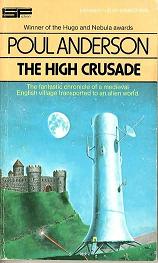
The High Crusade
Poul Anderson
167 pages
published in 1960
Poul Anderson has a not undeserved reputation as a deeply pessimistic, even depressing writer, largely based on his later novels which all seemed to share the assumption that human nature is unchangable, that evil will always be amongst us, progress impossible and the future will always end badly. It must have been something to do with his gloomy Danish genes. The High Crusade shows it was not always this way. Once upon a time even Poul Anderson could write a lighthearted science fantasy romp without some great clonking moral to mess it up.
Great fun it is too. It's the year 1345 and a small town in Lincolnshire is visited by a spaceship belonging to the Wersgorix Empire, while the local baron Sir Roger de Tourneville was busy gathering men to join king Edward III in France. Thinking the landing a French trick, he and his men storm the space ship and overwhelm and kill almost all of the aliens, who have long since grown unused to hand to hand combat. Ordering the remaining alien to take them to France, Sir Roger loads the entire town into the ship, but the alien tricks them and sets course back to the planet it came from. Lots of adventures and misunderstandings follow and it ends with Sir Roger conquering the entire Wersgorix Empire...
The whole story is told through the pen of brother Parvus, one of the monks at the local Fransciscan Abbey. Anderson makes great sport of getting across the Medieval bewilderment at where they find themselves, explaining what they see in terms that makes sense to their worldview. Which he does without making them look like idiots for the reader to feel superior to just because they "know" something the characters could not have. Anderson would be an early member of the Society for Creative Anarchonism a few years later, so his affinity for the Middle Ages on display here is not surprising.
The High Crusade might be a romp, Anderson still has a serious point to make, one he would make later in his more depressing later work as well: that a feudal society might just be the best society for humanity. In the epilogue to the story, when a scout ship from Earth makes contact with the now human ruled Wersgorix Empire, the ship's captain reads how it was the humans' feudalism that made them invincible in their conquest. Here it doesn't grate, even if I disagree with it, as it comes at the end of the stiory and you're not clubbed over the head with it...